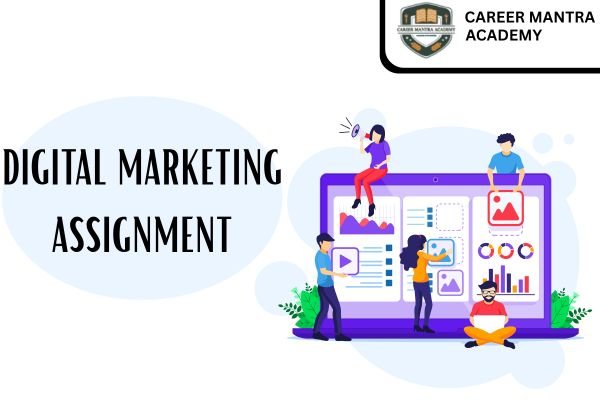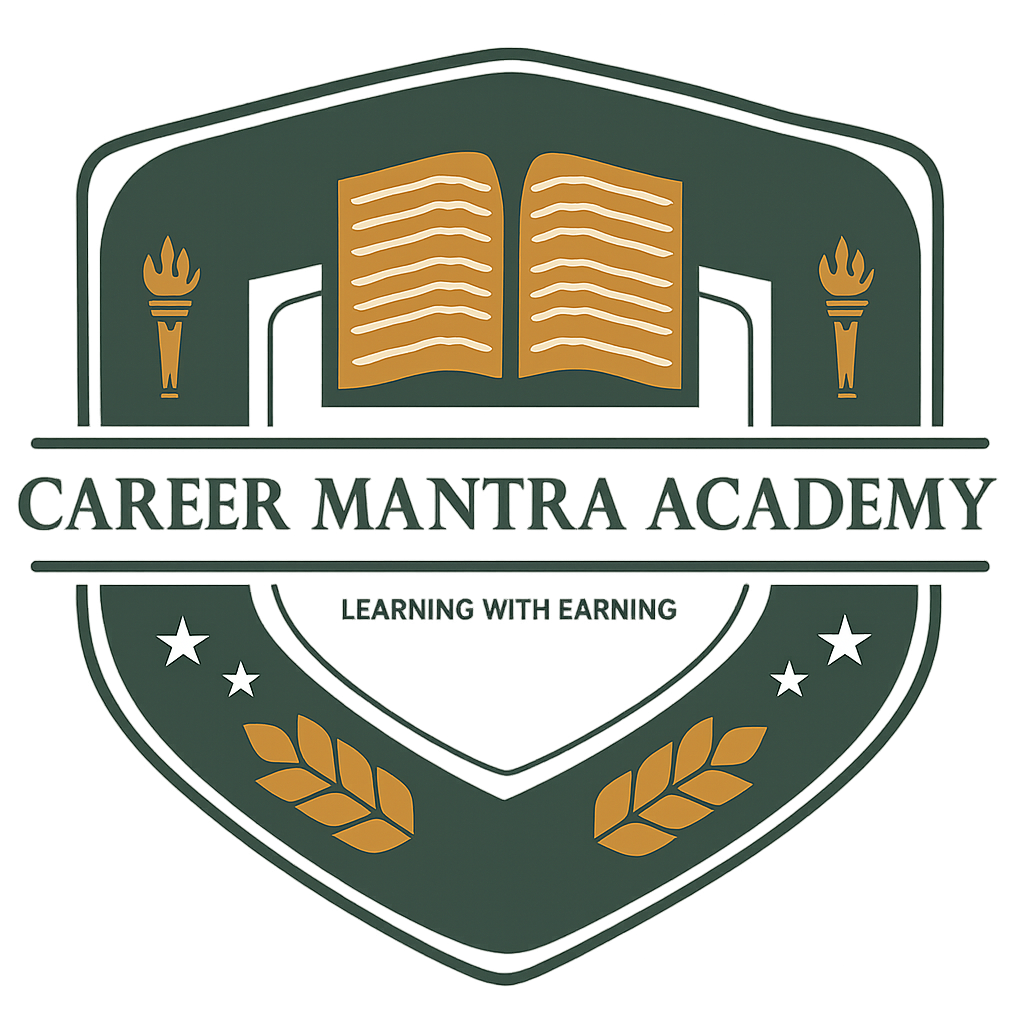
For Applying Digital Marketing Course Click Here…
Digital Marketing Assignment:
A digital marketing assignment is an academic or practical project designed to teach students how online marketing tactics work in real-world business situations. It emphasizes important elements like Google Ads, email marketing, social media marketing, SEO (Search Engine Optimization), and content strategy. Students gain knowledge about how to create, carry out, and evaluate digital campaigns that draw in and interact with online audiences through these assignments.
Developing analytical, creative, and strategic thinking abilities is the primary objective of a digital marketing assignment. It enables students to investigate how companies use digital channels to connect with consumers, boost visibility, and boost revenue. Students get practical experience with digital tools like Google Analytics, Canva, and Meta Ads Manager by working on these assignments. These tools are crucial in today’s marketing environment.
What Is Digital Marketing and Why Is It Important?
The use of online platforms, tools, and tactics to market goods, services, or brands to a specific audience is known as digital marketing. Digital marketing uses the internet and electronic devices to reach consumers through channels like search engines, social media, emails, websites, and mobile apps, in contrast to traditional marketing techniques that depend on print, radio, or television.
Search Engine Optimization (SEO), Pay-Per-Click (PPC) advertising, content marketing, social media marketing, email marketing, and affiliate marketing are some of its constituent parts. Each of these strategies aids companies in increasing sales, generating leads, and raising awareness in a quantifiable and economical manner.
Why Is Digital Marketing Important?
Here are some key reasons that highlight its importance:
1. Wider Reach:
Digital marketing enables businesses to reach customers worldwide, breaking geographical boundaries and expanding market presence.
2. Cost-Effective:
Compared to traditional advertising, online marketing offers affordable promotion options suitable for startups and small businesses.
3. Measurable Results:
With tools like Google Analytics and social media insights, marketers can track performance, engagement, and conversions easily.
4. Targeted Audience:
Campaigns can be customized to specific demographics, interests, and locations, ensuring better engagement and ROI.
5. Real-Time Interaction:
Digital channels allow brands to communicate directly with customers, respond to queries, and build long-term relationships.
6. Career Opportunities:
For students and professionals, digital marketing opens up diverse job roles such as SEO specialist, content marketer, and social media manager.
7. Adaptability and Innovation:
Businesses can experiment with new ideas, test campaigns, and adapt quickly to changing market trends.
How Does a Digital Marketing Assignment Help Students?
Students can better connect their theoretical knowledge with practical marketing strategies by completing a digital marketing assignment. It offers a chance to put what is learned in the classroom to use in real-world scenarios like data analysis, content production, and campaign planning. Students gain vital marketing, analytical, and creative skills that are highly sought after in the industry by working on such assignments.
As students learn to investigate market trends, pinpoint target audiences, and create strategies that complement corporate objectives, these assignments also help them become more adept at solving problems. Additionally, they prepare for professional roles by gaining practical experience with tools like social media platforms, SEO planners, and Google Analytics.
Key Benefits for Students:
- Practical Learning: Helps students understand real-life marketing challenges and strategies.
- Skill Development: Enhances creativity, data analysis, and communication skills.
- Industry Exposure: Familiarizes students with digital tools and platforms used by professionals.
- Career Readiness: Builds confidence to take on internships and entry-level marketing roles.
- Research Ability: Improves analytical thinking and report-writing skills.
Which Topics Are Best to Choose for Digital Marketing?
For a digital marketing assignment, picking the appropriate topic is crucial to producing engaging, pertinent, and perceptive work. Current trends, practical applications, and important marketing techniques that support online business growth should all be reflected in the topic. Students can demonstrate their creativity, research skills, and practical knowledge of digital tools by choosing a compelling topic.
Students can investigate a variety of topics, including influencer marketing, email campaigns, content strategy, social media marketing, and SEO optimization. These subjects offer a wealth of information for analysis and case studies in addition to showcasing contemporary marketing strategies.
Best Topics for Digital Marketing Assignments:
- The Role of Artificial Intelligence in Digital Marketing
- How SEO Improves Website Ranking and Traffic
- Impact of Social Media Marketing on Brand Awareness
- Importance of Content Marketing in Customer Engagement
- The Growth of Influencer Marketing in 2025
- How Email Marketing Builds Customer Loyalty
- Role of Video Marketing in Brand Promotion
- Future Trends in Digital Advertising and Automation
Which Tools and Platforms Are Most Useful for Digital Marketing Students?
To succeed in the wide-ranging field of digital marketing, students must be conversant with a range of tools and platforms. Effective marketing campaign planning, execution, analysis, and optimization can be facilitated by the use of the appropriate tools. A comprehensive guide to the best digital marketing tools and platforms is provided below, organized for ease of reading.
1. SEO (Search Engine Optimization) Tools
SEO is crucial for improving website visibility on search engines. These tools help students understand keyword strategies, website audits, and ranking analysis.
- Google Keyword Planner – Helps students find the right keywords, analyze search volume, and plan SEO campaigns.
- Ahrefs – Provides insights into backlinks, competitor analysis, and keyword ranking.
- SEMRush – Offers SEO audit, keyword research, competitor tracking, and site performance reports.
- Moz – Useful for tracking SEO metrics, analyzing page authority, and optimizing website content.
- Ubersuggest – A beginner-friendly tool for keyword suggestions, traffic analysis, and content ideas.
Benefits for students: Understanding SEO helps in improving website ranking, driving organic traffic, and learning competitive analysis techniques.
2. Social Media Marketing Tools
Social media platforms are essential for brand promotion, engagement, and audience growth. These tools help students plan, schedule, and analyze campaigns.
- Hootsuite – Allows scheduling posts, monitoring multiple social channels, and analyzing performance.
- Buffer – Helps in planning content calendars and tracking engagement metrics.
- Canva – A design tool for creating social media graphics, posts, and infographics.
- Later – Useful for Instagram scheduling, visual planning, and hashtag research.
- Sprout Social – Offers social listening, analytics, and audience engagement features.
Benefits for students: Mastering social media tools improves content strategy, helps track metrics, and develops brand communication skills.
3. Content Marketing Tools
Content marketing focuses on creating valuable material to attract and retain audiences. These tools assist in planning, creating, and optimizing content.
- Grammarly – Checks grammar, spelling, and tone to improve written content.
- BuzzSumo – Helps find trending topics and analyze competitor content strategies.
- CoSchedule Headline Analyzer – Optimizes blog titles for better engagement and SEO.
- Hemingway Editor – Improves readability and clarity of content.
- Evernote – Useful for note-taking, brainstorming, and organizing content ideas.
Benefits for students: These tools enhance writing skills, improve content quality, and help in research for digital marketing projects.
4. Email Marketing Tools
Email marketing is vital for nurturing leads and engaging customers. These tools allow students to design campaigns, segment audiences, and track performance.
- Mailchimp – Popular for creating email campaigns, automation, and analytics.
- Constant Contact – Provides email templates, list management, and performance reports.
- SendinBlue – Combines email marketing, SMS campaigns, and workflow automation.
- HubSpot Email Marketing – Useful for personalized campaigns, analytics, and lead nurturing.
- Benchmark Email – Beginner-friendly platform for designing and sending email campaigns.
Benefits for students: Learning email marketing tools helps understand campaign segmentation, personalization, and measuring engagement effectively.
5. Analytics Tools
Analytics tools are essential for measuring campaign performance and making data-driven decisions.
- Google Analytics – Tracks website traffic, user behavior, conversions, and campaign success.
- Hotjar – Provides heatmaps, session recordings, and user feedback analysis.
- Google Data Studio – Helps visualize data from various sources in interactive dashboards.
- Kissmetrics – Focuses on customer behavior tracking and conversion optimization.
- Mixpanel – Advanced analytics for user engagement, retention, and funnel analysis.
Benefits for students: These tools develop analytical skills, teach how to track KPIs, and improve data-driven decision-making.
6. Advertising & PPC Tools
Paid marketing campaigns help businesses reach their target audience quickly. These tools teach students how to manage ads, optimize budgets, and track ROI.
- Google Ads – Platform for running search, display, and video campaigns with performance tracking.
- Facebook Ads Manager – Manage campaigns on Facebook and Instagram, targeting specific audiences.
- LinkedIn Campaign Manager – Best for B2B advertising, lead generation, and professional targeting.
- AdEspresso – Helps create, test, and optimize Facebook and Instagram ads easily.
- Bing Ads – An Alternative paid search platform to reach different audience segments.
Benefits for students: Learning PPC tools teaches budgeting, targeting, ad optimization, and ROI analysis.
7. Graphic Design & Video Tools
Visual content is essential for engagement. These tools help students create professional graphics, videos, and animations.
- Canva – Design tool for social posts, infographics, and presentations.
- Adobe Spark – Create graphics, web pages, and short videos.
- Adobe Photoshop – Professional image editing and graphic creation.
- Final Cut Pro / Adobe Premiere Pro – Video editing software for marketing videos.
- Animoto – Easy platform for creating video content for campaigns.
Benefits for students: Mastery of design and video tools improves creativity, engagement, and professional presentation skills.
8. Project Management & Collaboration Tools
Digital marketing campaigns often require teamwork. These tools help students plan, collaborate, and manage projects efficiently.
- Trello – Organizes tasks, tracks progress, and manages marketing projects visually.
- Asana – Task management and project tracking for teams.
- Slack – A Communication and collaboration platform for team projects.
- Google Workspace – Collaborative tools like Docs, Sheets, and Drive for teamwork.
- Monday.com – Advanced project management with timelines and workflow automation.
Benefits for students: These tools improve teamwork, organization, and project planning skills.
9. Learning & Certification Platforms
Students can enhance their knowledge and validate skills using these platforms.
- Google Digital Garage – Free courses on digital marketing fundamentals.
- HubSpot Academy – Certifications in inbound marketing, social media, and content marketing.
- Coursera – Offers digital marketing courses from top universities.
- Udemy – Affordable courses on SEO, social media, and email marketing.
- LinkedIn Learning – Industry-relevant courses with certificates for resumes.
Benefits for students: These platforms provide knowledge, practical exercises, and certifications to boost employability.

How Can You Succeed in Digital Marketing?
Knowledge, practical skills, creativity, and flexibility are all necessary for success in digital marketing. Learning tools is only one aspect of achieving business objectives; another is knowing how to apply strategies successfully. Professionals and students can take a number of actions to establish a prosperous career in this area.
First and foremost, it’s critical to develop a solid understanding of digital marketing principles like SEO, PPC advertising, social media marketing, content marketing, and email marketing. Practical comprehension of these ideas is aided by online courses, certifications, and assignments.
Second, it’s critical to become proficient with digital marketing tools and platforms. Effective campaign planning, execution, and analysis are made possible by tools like Google Analytics, Canva, Hootsuite, Mailchimp, and SEMrush.
Third, keeping abreast of the most recent developments in algorithms and trends guarantees that your tactics continue to work. Staying competitive in the rapidly changing digital landscape requires constant learning.
Fourth, putting theoretical knowledge to use in practical settings is facilitated by obtaining practical experience through projects, internships, or freelancing.
Finally, consistent growth is ensured through campaign testing, analytics-based performance measurement, and strategy improvement based on outcomes.
Key Tips for Success:
- Build practical skills with assignments and projects.
- Stay updated with industry trends.
- Use the right digital marketing tools.
- Analyze and optimize campaigns continuously.
- Be creative and adaptable.
What Are the Common Mistakes Students Make in Digital Marketing Projects?
Although digital marketing projects are a great way for students to learn real-world skills, novices frequently make mistakes that make their campaigns less successful. Students can enhance their assignments and practical tactics by identifying these errors.
Here are the most common mistakes students make in digital marketing projects:
1. Lack of Clear Goals
- Many students start campaigns without defining measurable objectives.
- Without goals, it’s difficult to track performance or determine success.
2. Ignoring the Target Audience
- Failing to research and understand the target audience leads to irrelevant content.
- Campaigns must be tailored to audience interests, demographics, and behavior.
3. Poor Keyword Research
- In SEO or PPC projects, improper keyword selection can reduce visibility.
- Students often focus on high-volume keywords without considering relevance or competition.
4. Overlooking Analytics
- Many projects lack proper tracking and data analysis.
- Tools like Google Analytics are essential to monitor traffic, conversions, and engagement.
5. Inconsistent Content Quality
- Low-quality or irregular content can harm engagement and brand perception.
- Students should focus on informative, engaging, and original content.
6. Ignoring Mobile Optimization
- Most users access content via mobile devices.
- Failing to make websites or campaigns mobile-friendly can reduce reach and conversions.
7. Not Leveraging Social Media Properly
- Using social platforms without a strategy or consistency reduces impact.
- Scheduling posts, engaging with followers, and analyzing metrics are crucial.
8. Overcomplicating Campaigns
- Trying to include too many strategies at once can dilute focus.
- Students should prioritize key tactics and execute them effectively.
9. Copying Competitors Blindly
- Replicating competitors’ campaigns without creativity limits learning.
- Innovation and originality are key to standing out.
10. Neglecting Feedback and Improvement
- Ignoring results and feedback prevents optimization.
- Continuous improvement based on data ensures campaign success.
How Is Digital Marketing Different from Traditional Marketing?
| Aspect | Digital Marketing | Traditional Marketing |
| Definition | Uses online platforms and digital channels to promote products or services. | Uses offline channels like TV, radio, newspapers, and billboards for promotion. |
| Reach | Global reach; can target audiences anywhere in the world. | Limited to local or regional audiences. |
| Cost | Generally more cost-effective with flexible budgets. | Often expensive due to printing, broadcasting, and distribution costs. |
| Measurability | Performance is measurable in real-time through analytics tools. | Two-way communication allows engagement and feedback from customers. |
| Audience Targeting | Highly targeted based on demographics, interests, behavior, and location. | Less precise; relies on general audience segmentation. |
| Interaction | Two-way communication; allows engagement and feedback from customers. | Mostly one-way communication; limited interaction. |
| Speed | Campaigns can be launched quickly and adjusted instantly. | Takes longer to plan, launch, and modify campaigns. |
| Content Types | Blogs, social media posts, videos, emails, online ads. | Print ads, TV/radio commercials, posters, flyers. |
| Analytics & Optimization | Allows real-time tracking, testing, and optimization. | Limited ability to track or optimize campaigns once launched. |
| Flexibility | Easy to adapt campaigns based on performance and trends. | Less flexible; changes are costly and time-consuming. |
How Does Digital Marketing Prepare You for a Career in Marketing?
Learning digital marketing gives students skills that are directly applicable to a professional marketing career, as it is one of the fastest-growing fields in the modern business world. Here’s a detailed look at how digital marketing gets you ready for a lucrative career:
Step 1: Understanding Marketing Fundamentals
Digital marketing teaches students the basics of marketing, including market research, consumer behavior, branding, and promotion strategies. These foundational concepts are essential for any marketing role.
Step 2: Learning Practical Skills
Through digital marketing projects and assignments, students gain hands-on experience with SEO, content creation, social media marketing, email campaigns, PPC advertising, and analytics tools. This practical knowledge ensures they can execute real campaigns effectively.
Step 3: Gaining Technical Knowledge
Students learn to use industry-standard tools such as Google Analytics, SEMrush, Canva, Hootsuite, and Mailchimp. Familiarity with these tools enhances employability and prepares them for roles like SEO specialist, content marketer, or social media manager.
Step 4: Developing Analytical Abilities
Digital marketing emphasizes measuring performance, tracking KPIs, and interpreting data. Students develop analytical thinking, allowing them to optimize campaigns and make data-driven decisions in a professional environment.
Step 5: Enhancing Creativity and Communication
Creating engaging content, designing campaigns, and interacting with audiences sharpen creative and communication skills. These abilities are crucial for developing campaigns that resonate with target audiences.
Step 6: Building Problem-Solving Skills
Students learn to identify issues, test solutions, and improve campaigns. This problem-solving mindset is highly valued in marketing careers, helping professionals adapt to changing trends and challenges.
Step 7: Preparing for Career Growth
Finally, digital marketing exposure provides confidence and industry knowledge, enabling students to apply for internships, freelance work, and entry-level jobs. Continuous learning and certifications further enhance career prospects.

Why choose Career Mantra Academy for the Digital Marketing Course?
One of the top training facilities for digital marketing is Career Mantra Academy, which provides thorough programs for both professionals and students. The academy helps students acquire skills that are relevant to the industry by offering real-time projects and practical, hands-on learning. Students have access to seasoned instructors, cutting-edge resources, and individualized career development advice. In order to ensure well-rounded expertise, the curriculum covers SEO, social media marketing, content creation, email marketing, and analytics. Career Mantra Academy also improves employability by providing certification and placement assistance. Selecting this academy gives students the information, abilities, and self-assurance they need to thrive in the cutthroat field of digital marketing.
Conclusion.
Students gain practical skills, industry knowledge, and firsthand experience through digital marketing assignments. Students gain effective campaign planning, execution, and analysis skills by working on SEO, social media, content, and email marketing projects. These assignments foster creativity and analytical abilities, help students stay current with trends, and help them avoid common mistakes. All things considered, they equip students for prosperous careers in the rapidly changing field of digital marketing.
FAQs
What is the introduction of digital marketing?
Digital marketing is the practice of promoting products or services using online platforms and digital channels. It includes SEO, social media, email marketing, content creation, and online advertising. This approach helps businesses reach a wider audience, engage customers, and measure results effectively in today’s digital-driven world.
What are the 7 types of digital marketing?
The seven types of digital marketing are SEO, content marketing, social media marketing, email marketing, PPC advertising, affiliate marketing, and influencer marketing, each targeting audiences online to boost engagement and sales.
Which is best in digital marketing?
The “best” in digital marketing depends on your goals. SEO boosts organic traffic, social media marketing builds engagement, email marketing nurtures leads, and PPC ads drive quick results. Combining these strategies often delivers the most effective and sustainable outcomes for businesses and marketers.
What is the importance of digital marketing?
Digital marketing is important because it enables businesses to reach a global audience, engage customers directly, and measure campaign performance in real-time. It is cost-effective, adaptable, and helps build brand awareness, generate leads, and drive sales, making it essential for growth in today’s digital-driven world.
Which skill is best in digital marketing?
The most valuable skill in digital marketing is SEO (Search Engine Optimization) because it drives organic traffic and improves online visibility. However, skills like content creation, social media management, data analytics, PPC advertising, and email marketing are also crucial for a well-rounded digital marketing career.
